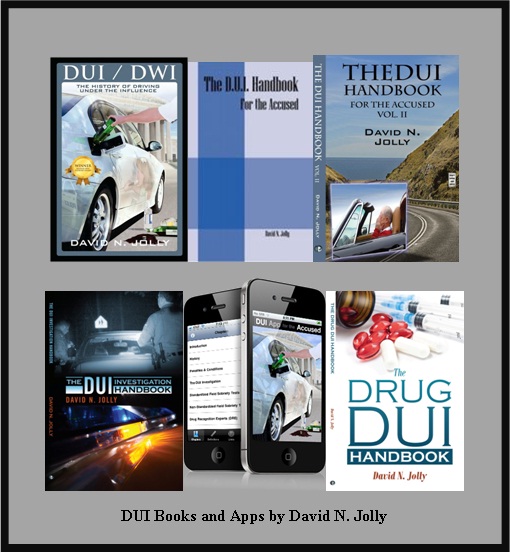Mukilteo Edmonds Snohomish County Drunk Driving DUI Lawyer: The Drug DUI Handbook
Mukilteo Edmonds DUI / DWI / Drunk Driving Lawyers- Experienced, Successful, Affordable
(425) 493-1115
The following is an excerpt from the upcoming book “The Drug DUI Handbook,” due to be published in September, 2011. Jolly, David N. The Drug DUI Handbook. Outskirts Press Inc. (2011)
Proper protocol must be used to collect the blood sample, otherwise the blood analysis will be flawed and have no evidentiary value. The American Medical Association suggests the following procedures:
1. Hypodermic needles and syringes (must) be sterile and disposable. When reusable equipment is utilized, it should neither be cleaned with nor stored in alcohol or other volatile solvents.
2. Only a chemically cleaned, dry tube or vial with inert stopper should be used. Neither alcohol nor volatile solvents should be used to clean them. The tubes and vials should contain an anticoagulant (recommended are fluoride, citrate, oxalate and heparin), and a preservative (recommended are fluoride and mercury salt.) See American Medical Association, Alcohol and the Impaired Driver: A Manual of the Medical- Legal Aspects of Chemical Tests for Intoxication with Supplement on Breath/Alcohol Tests (1976 reprint). The anticoagulant in the vial is designed to prevent the sample from clotting inside the vial. The preservative prevents yeast growth, which may cause the blood to ferment, thereby increasing the concentration of ethyl alcohol in the sample. Finally, the sample should be refrigerated during storage with 1% sodium fluoride. Lesser concentrations may allow microorganisms to grow, thereby inhibiting glycolysis. See Kaye, “The Collection and Handling of Blood Alcohol Specimen,” 75 American Journal of Clinical Pathology 743 (1980). Areas of concern or inquiry as to the validity of the blood sample include:
• The collection of the blood sample by the nurse, doctor or phlebotomist;
• Use of an appropriate blood collection kit;
• The transportation of the blood;
• The storage of the blood;
• The preparation of the blood for testing;
• The testing of the blood;
• The chain of command in handling the blood;
• The reporting of the blood alcohol level.
For information on your Washington State DUI / Drunk Driving, Snohomish County DUI, King County DUI, Skagit County DUI, Island County DUI or Whatcom County DUI please contact our Washington State DUI drunk driving attorneys for a free consultation at 425-493-1115, email us at david@davidjollylaw.com, or check out our main website at http://www.washdui.com or www.mukilteodui.com, www.everett-dui.co, www.marysville-dui.com, www.dui-bothell.com, or www.anacortesdui.com. We represent DUI clients in every court in Western Washington including Seattle DUI cases, Kirkland DUI cases, Redmond DUI cases, Shoreline DUI cases, Lynnwood DUI cases, Everett DUI cases, Mukilteo DUI cases, Marysville DUI cases, Mt. Vernon DUI cases, Anacortes DUI cases, and Bellingham DUI cases.
Author of The DUI Handbook for the Accused, DUI/DWI: The History of Driving Under the Influence, The DUI Investigation Handbook and The Drug DUI Handbook.
Mukilteo Edmonds DUI / DWI / Drunk Driving Lawyers- Experienced, Successful, Affordable (425) 493-1115


No comments:
Post a Comment